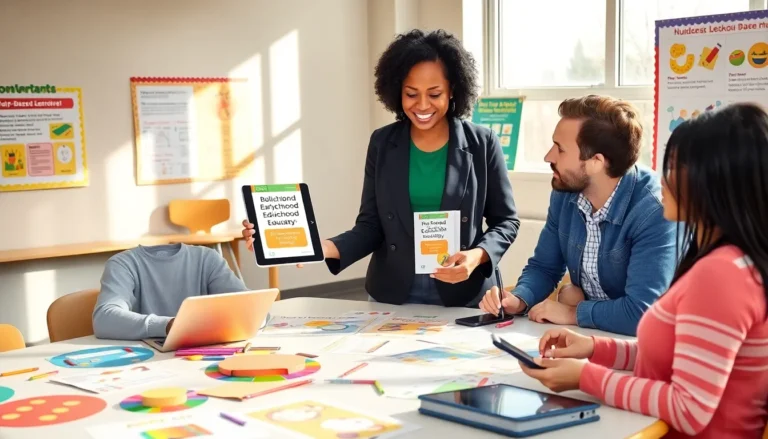Table of Contents
TogglePublic discourse isn’t just a fancy term for chit-chat over coffee; it’s the lifeblood of democracy. It shapes opinions, influences decisions, and sometimes, it even leads to a heated debate over pineapple on pizza. In a world where social media reigns supreme, the way people communicate can make or break societal progress.
Imagine a vibrant marketplace buzzing with ideas, where everyone’s voice matters. That’s the essence of public discourse. It’s not just about shouting louder than the person next to you; it’s about engaging in meaningful conversations that spark change. Whether it’s a town hall meeting or a viral tweet, each interaction contributes to the larger narrative. Dive in as we explore the nuances of public discourse and discover why it’s crucial for a thriving society.
Overview of Public Discourse
Public discourse serves as a cornerstone of democratic societies. It involves the exchange of ideas and opinions among citizens, fostering a culture of openness and debate. Essential components include discussion forums, town hall meetings, and online platforms. Each medium contributes to the development and dissemination of diverse viewpoints.
In this digital age, social media amplifies public discourse. These platforms facilitate rapid communication, allowing individuals to share thoughts with a broader audience. Active participation in discussions ensures that various voices contribute to societal issues. Engaging in constructive dialogues helps build understanding and drives informed decision-making.
Public discourse influences political processes significantly. Elected officials often gauge public opinion through various channels. Polls, surveys, and social media interactions provide insight into constituents’ concerns and priorities. Consequently, political leaders shape policies based on the prevailing sentiments expressed through discourse.
Moreover, education plays a crucial role in enhancing public discourse. Learning environments that encourage critical thinking enable individuals to articulate their views effectively. Schools and universities fostering debate create spaces where students explore diverse perspectives. Those experiences cultivate a generation capable of engaging in meaningful conversations about critical issues.
Finally, the health of public discourse directly impacts societal well-being. Strong discourse contributes to community cohesion and promotes social change. Collaborative discussions can lead to solutions for pressing challenges. By prioritizing open communication, societies position themselves to address conflicts and work towards shared objectives.
Importance of Public Discourse
Public discourse plays a critical role in democratic societies. It involves the sharing of diverse opinions and ideas that shape community values and policies.
Engaging Citizens
Encouraging citizen participation enhances democracy. Open dialogues in forums and town hall meetings invite individuals to express their perspectives. Citizens gain a sense of ownership over community issues, fostering a connection to local governance. Utilizing social media platforms maximizes outreach, enabling real-time interactions that keep the conversation lively. Active engagement transforms passive observers into informed participants who can influence change effectively. Citizens recognizing their role in shaping the social landscape contribute to a healthier democratic process.
Shaping Public Opinion
Public discourse directly impacts public opinion. Discussions allow for the exploration of varied viewpoints, facilitating the development of informed consensus. Policymakers rely on gauging public sentiment through surveys and social media feedback. Engaging with constituents enables elected officials to adapt their policies to reflect the needs of the community. Ideas exchanged in public forums influence not just political landscapes, but cultural norms as well. Participation in public discourse cultivates an informed citizenry capable of advocating for their needs and interests.
Challenges in Public Discourse
Public discourse faces significant challenges that hinder thoughtful exchanges.
Misinformation and Disinformation
Misinformation spreads rapidly, especially on social media platforms. It misleads audiences, creating confusion around important issues. Disinformation deliberately spreads false information to manipulate public opinion. Fact-checking services identify misleading claims, but their reach varies. Clear communication from trusted sources can mitigate these challenges, yet skepticism persists among audiences. Public awareness campaigns educate individuals about recognizing credible information. Educating citizens on media literacy ultimately strengthens public discourse and combats the adverse effects of misinformation.
Polarization and Division
Polarization increases as individuals gravitate toward echo chambers that reinforce their beliefs. This division hampers constructive dialogue and prevents collaboration on societal challenges. Communities experience growing tensions when differing views escalate into confrontations. Civic spaces that promote inclusivity can reduce such divisions. Initiatives that encourage diversity of thought foster understanding and cooperation among contrasting perspectives. Frequent open forums and community discussions provide opportunities to bridge divides. Public discourse thrives when individuals engage openly, leading to stronger communal bonds.
Role of Media in Public Discourse
Media plays a crucial role in shaping public discourse by providing platforms for information dissemination and dialogue. It influences how individuals engage with societal issues.
Traditional Media
Traditional media encompasses newspapers, television, and radio, serving as primary sources of news and information. These outlets often offer in-depth analysis of current events, allowing for a comprehensive understanding of complex topics. Journalists investigate and report on issues that matter, helping to inform the public and stimulate discussion. Local newspapers, for example, can highlight community concerns, fostering engagement among residents. Additionally, traditional media typically employs editorial standards, which enhances credibility. Through editorial boards and opinion pieces, citizens encounter varied perspectives that enrich public discourse.
Social Media Platforms
Social media platforms revolutionize how individuals participate in public discourse by facilitating instant communication. They empower users to share thoughts and engage with diverse viewpoints. For instance, Twitter allows real-time conversations, while Facebook enables the formation of community groups. The viral nature of posts can amplify voices that might otherwise remain unheard. However, social media also presents challenges, such as misinformation and echo chambers. Engaging with verified accounts and fact-checking resources becomes essential for maintaining informed discussions. Overall, these platforms enable broader participation, enhancing the public’s ability to influence policy and social change.
Strategies to Enhance Public Discourse
Promoting critical thinking through education significantly enhances public discourse. Fostering environments that encourage dialogue helps individuals articulate their views effectively. Implementing programs focusing on media literacy equips citizens with the skills to navigate information landscapes.
Encouraging diverse perspectives strengthens conversations within communities. Facilitating inclusive forums and discussions allows for varied viewpoints to emerge, promoting mutual understanding. Establishing ground rules for respectful dialogue can prevent conflicts and foster productive exchanges.
Utilizing technology in innovative ways increases outreach and engagement. Social media platforms can serve as conduits for real-time discussions, connecting people across different backgrounds. The use of verified accounts and fact-checking resources helps maintain the integrity of these interactions.
Engaging local leaders in public forums encourages citizen participation. Local officials can address community concerns directly, showcasing transparency in decision-making processes. Encouraging regular town hall meetings and public hearings fosters accountability and strengthens community ties.
Building coalitions among diverse groups can bridge divides. Collaborating on issues like community improvement encourages constructive dialogue, allowing shared goals to emerge. Involving underrepresented voices ensures that public discourse is comprehensive and reflective of societal needs.
Finally, combating misinformation requires a concerted effort. Fact-checking services and awareness campaigns can educate citizens about reliable information sources. Fostering a culture of inquiry encourages individuals to question and evaluate the information they consume, enhancing the quality of public discourse.
Public discourse is vital for a thriving democracy. It fosters engagement and encourages citizens to voice their opinions. As society navigates the complexities of the digital age, the importance of maintaining healthy dialogue becomes even more pronounced.
By promoting critical thinking and inclusivity, communities can bridge divides and enhance understanding. Addressing challenges like misinformation and polarization will strengthen public discourse and empower citizens to participate actively.
In a world where diverse viewpoints are essential, nurturing public discourse will pave the way for informed decision-making and social progress.




